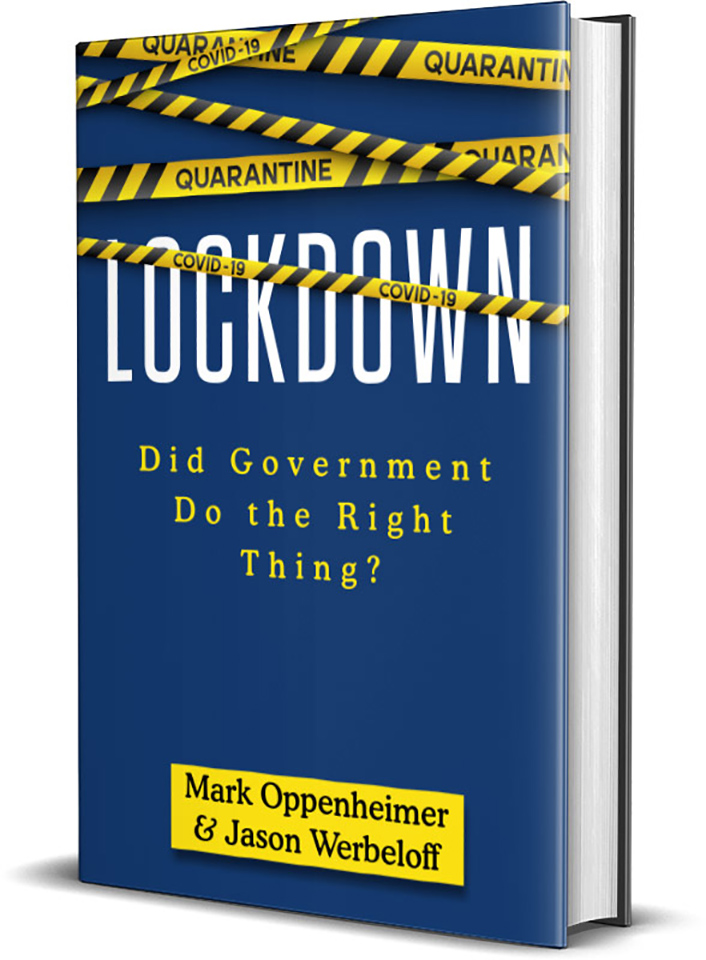click to dowload our latest edition
CLICK HERE TO SUBSCRIBE TO OUR NEWSLETTER


Published
4 years agoon
By
Jordan MosheSouth Africans have endured a tough time under the lockdown imposed by the government in March, from extended alcohol bans to crippling job losses. While the country is still reeling, many of us question whether the government did the right thing. Were the draconian measures justified? What has it achieved?
Advocate Mark Oppenheimer and philosopher Dr Jason Werbeloff grapple with these questions in their newly released book: Lockdown: Did Government Do the Right Thing?
They attempt to understand the consequences of lockdown by studying statistics and weighing up the ethical and moral dimensions of the government’s choices.
Says Oppenheimer, “Our aim is to use moral principles to evaluate whether the government has done the right thing.”
The project they started in April takes the form of a dialogue between the authors, avoiding burdening readers with statistically heavy and academically impenetrable material.
“We spent of a lot of time carrying out research, making sure the stats were up to date and really thinking about the problems involved in lockdown,” says Oppenheimer. “Effectively, the government made a choice about saving lives, a decision that isn’t as straightforward as one might assume. Every choice has consequences.
“Essentially, we believe that the government needs to be sensitive to the shifts which have taken place over time,” he says. “A strenuous lockdown may be justifiable at certain times, but if matters improve and mortality rates drop, reality demands a change of approach.
“We wanted to find out how dangerous lockdown really is, who it’s dangerous for, and who can benefit from it. Unfortunately, lockdown has become a political issue, with people picking a side and ignoring the facts which don’t suit them. We aimed to avoid that and instead piece all opinions together.”
Their findings have highlighted a number of worrying facts, among them the contraction of South Africa’s gross domestic product in the second quarter by an annualised 51%. In the long term, this could have devastating consequences for our country’s health, leaving many unable to afford medication or starving to death for lack of money for food.
“This is a toll that isn’t being exacted on Northern Europe despite its measures,” says Oppenheimer. “You can’t have a one-size-fits-all model. It’s well and good to impose a lockdown in America where a $3 trillion (R50 trillion) bailout is possible. This will never happen in South Africa.”
Oppenheimer believes that the only legitimate grounds for a lockdown is the buying of time to ensure that the country’s healthcare system can cope with a rise in cases. Beyond that, its justification proves less compelling.
“There are four different groups of people we identified when it comes to contracting the virus. The asymptomatic; those who get it but can recover at home; those who get it and require hospitalisation; and those who, despite being hospitalised, will die in hospital because of the virus,” says Oppenheimer.
“Lockdown saves only the third category, nobody else. It was instituted to better prepare the medical system, after which we must allow events to take their course. An indefinite lockdown aimed at eradicating the virus isn’t feasible because it comes for you when you reopen the country.
“You can’t stop the virus. All you can do is buy time and get the healthcare system ready. Waiting in lockdown until a vaccine comes around just isn’t an option for South Africa.”
Oppenheimer says this begs the question why we have allowed lockdown to persist in spite of seeing that our healthcare system is able to cope with the rise in cases. Government predictions have proven grossly inaccurate, and in spite of this being glaringly obvious, the approach used hasn’t changed.
“Lockdown hasn’t been sensitive to changing realities,” he says. “Because there was a paucity of information in February, caution seemed best, and many of us were happy to go into lockdown for three weeks. It may have been the best choice at the time.
“However, persisting with it without taking into account the change in expected mortality rate or hospital preparedness makes lockdown potentially illegitimate.”
Since the onset of lockdown, South Africa has charged thousands of citizens for violating various restrictions, including buying cigarettes and walking their dogs. According to Oppenheimer, this suggests that the emphasis has shifted from saving lives to controlling citizens, as well as overlooking the secondary consequences of lockdown.
“Cooping people up for so long leads to social unrest,” he says. “We’re seeing it in America, and now in South Africa with the Clicks issue. If you keep people at home, they will get upset. Our economic turmoil has social consequences. Crime is escalating, and protest is on the rise.
“Further along, we may see political consequences, perhaps regime change, or at least a big dip in support from people who feel betrayed. The knock-on effect will be huge.
“We have to recognise that lockdown is a complex problem which demands deeper consideration,” Oppenheimer says. “Some decisions have been wrong, but there was good reason for them at the time. We must reflect on the government’s decisions, and ensure that the ones made in future are appropriate.”
